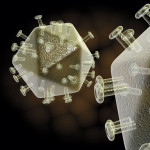An investigational agent known as ABX464 succeeded in tapering the size of the viral reservoir in people on successful antiretroviral (ARV) treatment for HIV but did not delay the time it took for the viral load to rebound after these individuals interrupted their treatment, aidsmap reports.
Presenting their findings at the 16th European AIDS Conference in Milan, Italy, researchers studied the effects of ABX464, which works by preventing HIV-infected cells from producing viable new copies of virus. Instead, the cells wind up sending small elements called peptides that in turn alert the immune system to the existence of an infected cell, thus prompting a response to eliminate that cell.
The new Phase IIa double-blind, randomized trial of ABX464 compared with a placebo included 30 people with HIV who had been taking boosted Prezista (darunavir) as monotherapy (meaning they took no other ARVs) for at least eight weeks and who had a viral load below 50. The participants had been on ARV treatment for a median of 5.6 years before the study began.
The study members were randomized to add to their existing ARV treatment, on a double-blind basis, 50 milligrams or 150 mg of ABX464 once daily or to receive a placebo. Then, after 28 days of this protocol, they interrupted all their HIV treatment and if their viral load rose above 1,000 started on boosted Prezista monotherapy again. Twenty-eight of the participants completed treatment and interrupted treatment.
Four weeks after interrupting treatment, eight of those who received ABX464 were considered to have responded to the treatment, with the amount of HIV DNA in their bodies dropping by more than 25 percent, for an average drop of 38 percent among them.
As for the change in level of HIV DNA that is integrated into cells and therefore most likely to prompt new copies of the virus, seven of those who received ABX464 and one person in the placebo arm experienced a reduction of more than 25 percent, for an average drop of 55 percent among those who responded to the treatment.
These promising signs notwithstanding, ABX464 was not associated with a reduction in the time to viral rebound after interrupting HIV treatment.
The most common adverse events in the study were mild to moderate abdominal pain and headache. One individual stopped taking ABX464 because of abdominal pain.
To read the aidsmap article, click here.







Comments
Comments